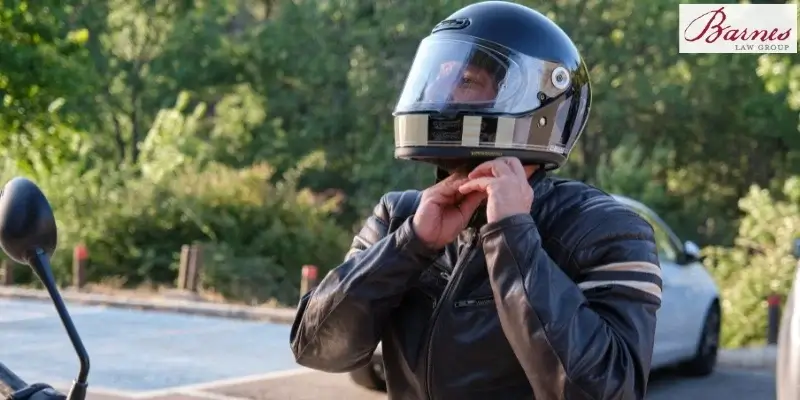Georgia Motorcycle Helmet Laws Explained

Georgia is a hotspot when it comes to motorcycle riding. Between our seasonably warm weather and the beautiful landscape the state has to offer, motorcycle enthusiasts flock to Georgia to hit the open road. While riding on a motorcycle can be a thrilling and exciting experience, it can also be extremely dangerous. Motorcycles do not allow their riders the same level of protection that cars do so it can be wise to become familiar with Georgia motorcycle helmet laws.
It is vital to be aware of Georgia motorcycle helmet laws as they can help you avoid accidents and certain traffic violations. Failing to understand these laws could result in fines or other penalties, but it could also lead to significant and life-threatening injuries in the case of a motorcycle accident. At Barnes Law Group, we hope to educate you on these laws and how they might affect you should you ever become involved in an accident on the state’s roadways.
Georgia Motorcycle Helmet Laws
In Georgia, any individual who is riding on a motorcycle, regardless of whether they are the individual controlling the vehicle or a passenger, must be wearing a helmet. These laws are put in place to help reduce the number of traumatic brain, neck, and head injuries often suffered in these kinds of accidents. Not only are these injuries devastating, but they can also be fatal, and a helmet can be all that stands in the way of losing your life to these accidents.
There are only a handful of exceptions to these rules. First, the helmet laws of Georgia do not apply to a passenger in an enclosed cab or motorized car. It also does not apply to a passenger or the driver of a three-wheeled motorcycle that is only used for agricultural reasons.
In addition to wearing a helmet, the motorcycle operator must also be wearing certain forms of protective eyewear approved by the Department of Transportation if their motorcycle does not have a windshield. This can typically include helmet visors or goggles.
Helmets and Protective Gear Standards in Georgia
In Georgia, motorcycle helmets must meet certain standards as outlined by the Department of Transportation’s Federal Motor Vehicle Safety Standard, or FMVSS. There are several key points regarding headgear and helmets, including:
- The inner lining. First, the thickness of the inner liner of your helmet or protective headgear must be at least an inch thick. It should also be made with a study form, such as polystyrene, which can help absorb any impact in the event of a crash. It should also include a comfort lining that can help provide the rider with comfort and work to absorb moisture so sweat does not drip into the eyes while operating the bike.
- The design. The helmet should allow for a peripheral vision clearance of at least 105 degrees on each side. They should also come with a strong chin strap to attach to the helmet with rivets. The helmet should also have a permanent label that shows the name of the manufacturer, the model designation, the size of the helmet, and the Department of Transportation symbol.
- The weight. Georgia requests that all motorcycle helmets weigh at least three pounds. Many helmets that do not meet these standards only weigh about one pound or less.
Helmets Can Protect You From Harm
Helmets are required in Georgia for a variety of reasons. Failing to do so could result in facing fines, jail time, and community service. Avoiding these legal penalties is one reason for wearing a helmet, but there are several other reasons, including those that prove that wearing a helmet can actually protect you from harm.
Wearing a helmet can significantly reduce your risk of suffering a severe brain injury during a motorcycle crash. They can also protect your eyes from dust, bugs, or other forms of debris that could get into your eyes and obscure your vision. Similarly, a helmet and protective eyewear can protect you from heavy winds, rain, and sun glares that can also impede your ability to safely operate your motorcycle.
If you suffer a motorcycle accident in Georgia, the at-fault party is liable for the damages you face. However, if you have failed to wear a helmet, this may be considered negligence on your part and could affect your ability to recover compensation for the injuries you sustained, even if the accident was the fault of another driver.
FAQs
Q: What Injuries Are Common in Motorcycle Crashes?
A: It is no surprise that motorcycle accidents are oftentimes worse than car accidents due to the fact that motorcycle riders do not have the same protection offered to drivers of cars. The most common injuries seen in motorcycle crashes in Georgia include traumatic brain injuries, whiplash, road rash, burns, herniated disks, jaw and nose fractures, and spinal cord injuries.
Q: How Much Does a Personal Injury Lawyer Cost?
A: For many personal injury lawyers across Georgia, they use a contingency fees agreement, meaning they only get paid if they win your case. This means you usually won’t pay any upfront charges or hourly fees. Instead, your attorney typically takes a specified percentage of your overall compensation award, which is addressed in an attorney’s contingency fee agreement.
Q: How Can Failing to Wear a Helmet Impact My Chances for Compensation?
A: In some motorcycle accident claims, determining liability might not be altogether straightforward. This can especially be the case if you were not wearing a helmet at the time of the accident. The other party and their legal teams may be able to argue that, by not wearing a helmet, you worsened your own injuries, you did not uphold your own duty of care to safely operate your bike, and that they should not be held liable for your losses.
Q: How Long Does It Take to Recover Compensation for a Motorcycle Accident?
A: It can be difficult to offer an exact timeline as to how long it might take for you to recover compensation for a motorcycle accident in Georgia. This is due to the fact that there are several variables involved with these claims that can affect the overall time frame. These variables can include the complexity of your case, the severity of your injuries, the availability of the evidence, and the cooperation of all parties involved.
Speak With a Motorcycle Accident Injury Lawyer Today
At Barnes Law Group, our personal injury lawyers are here to protect your right to full compensation. Contact our offices today to learn more regarding our legal services, how motorcycle helmet laws might affect your case, and to schedule your free consultation with our team.

Request A Consultation
Phone: 770.BARNES LAW (227-6375)
FILL OUT THE BELOW FORM TO REQUEST A FREE CASE EVALUATION
Fields Marked With An ” *” Are Required


